When financial access is weaponized, who decides who can participate in the modern economy?
Written by: Edward Woodford
Translated by: Block unicorn
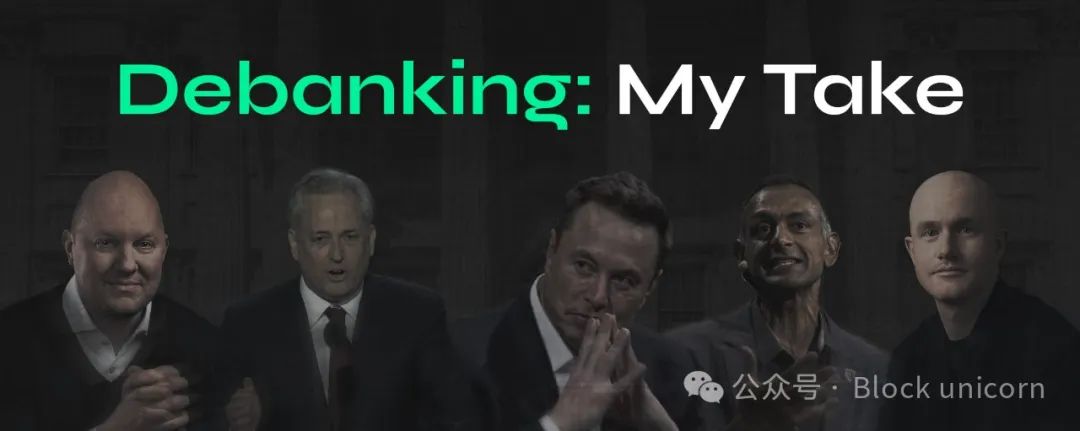
In a recent conversation on "The Joe Rogan Experience," Marc Andreessen (@pmarca) highlighted a concerning trend affecting the financial landscape: debanking. Under pressure from regulators and advocacy groups, financial institutions are increasingly refusing to provide banking services to individuals, organizations, and entire industries. I believe a key point regarding debanking has been overlooked in the narrative, specifically as follows:
0. Overview
A. Reaching a Consensus on the Definition of Debanking
Debanking is not a binary concept. Instead, it is a widespread attempt to limit financial services to specific industries, rather than treating every participant in that field based on risk assessment. Zero Hash and other primary players in the stablecoin and cryptocurrency space have strong banking partners, but this fact does not negate the existence of "debanking." Specifically, we hold client and operational funds in several of the top 20 banks.
The counterargument I hear is that banks have the right to decide whom they serve based on risk assessment. However, the difference here is:
Emphasizing specific industries directly contradicts the guidelines issued by the OCC (Office of the Comptroller of the Currency), which clearly state that broad, categorical discrimination against businesses engaged in lawful activities is not permitted.
The FDIC (Federal Deposit Insurance Corporation) has attempted to unilaterally pre-determine the risk profiles of banks, rather than allowing banks to determine this themselves. Regulators setting risk profiles for legitimate businesses contradicts the OCC's long-standing directive that regulatory banks should make deposit account decisions based on their risk assessments of all customer accounts. This is an extreme form of "implicit regulation" (a term I introduced in a recent blog), through which it can be explicitly stated that certain activities will be subject to strict scrutiny, creating such a burden that effectively prevents certain activities that are not prohibited by law.
B. Debanking is a Reality
Of course, the effects of debanking are evident; we have experienced bank accounts being closed within a day, including those with partners we have worked with since 2017.
The breadth of the impact is incredible. We were nominated for an award, and the candidate dinner for that award was sponsored by a bank. I was uninvited at the bank's request due to "the potential misunderstanding of paying for my dinner."
We operate a business across multiple jurisdictions. The same bank provides banking services for all our non-U.S. subsidiaries but does not serve our U.S. entity. Same owners, same risk profile.
In the past 18 months, among over 120 banks we proactively contacted, about 80% refused to engage in any substantive discussions (to examine risk profiles in more detail) purely based on the industry we are in.
C. Why Should Everyone Care?
Is this a rights issue? Banking is essential to modern life (and any business), and arbitrary refusals to provide banking services raise constitutional and ethical concerns.
Higher costs. Reduced competition distorts the market.
Creates concentrated risk. The fewer banks able to serve a particular industry, the more concentrated the risk becomes, increasing the risk to the customer base.
Andreessen used the term "Operation Choke Point 2.0" (originally coined by @nic__carter), which bears similarities to the controversial initiative during the Obama administration. At that time, regulators pressured banks to sever ties with legitimate but politically disfavored industries. Today, this trend has expanded, with industries like cryptocurrency being denied banking services not due to illegal activities, but because of reputational issues or political pressure.
The banking industry has long been viewed as a neutral utility, but it has now become a battleground for cultural, political, and economic conflicts. The question we must ask is: when financial access is weaponized, who decides who can participate in the modern economy?
1. The Rise of Debanking in Public Discourse
Since Andreessen's appearance on November 26, discussions on this topic have accelerated:
November 29 — Former PayPal president and Lightspark co-founder David Marcus (@davidmarcus) shared a post about how political pressure stifled Meta's stablecoin project, Libra.
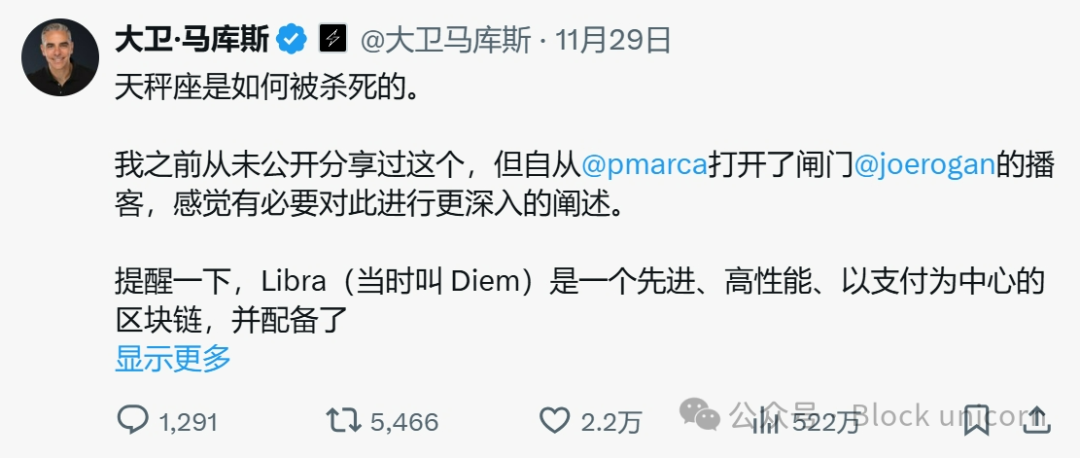
Elon Musk (@elonmusk) reacted to Marcus's post with a "Wow."

Coinbase (@coinbase) CEO Brian Armstrong (@brian_armstrong) shared Marcus's post, adding, "This makes sense — the government is (again) pressuring banks."
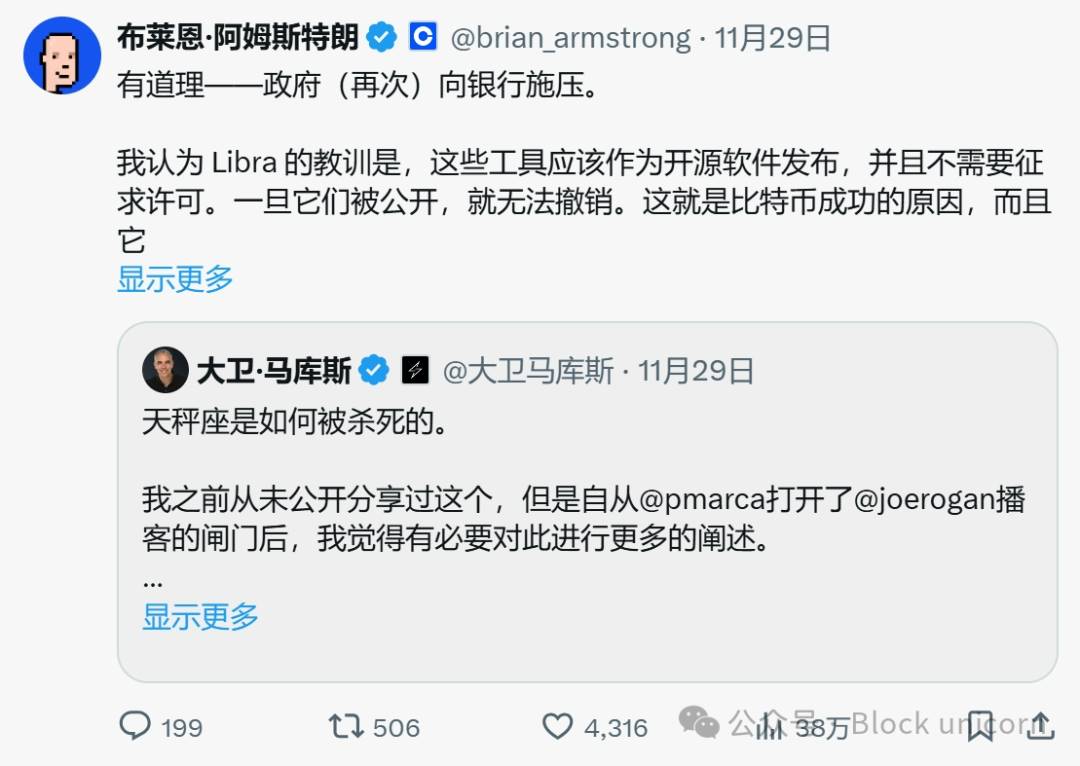
December 4 — U.S. Congressman French Hill (@RepFrenchHill) spoke in Congress about the issue of debanking in the cryptocurrency industry, pledging to "stop, reverse, and investigate 'Operation Choke Point 2.0.'"
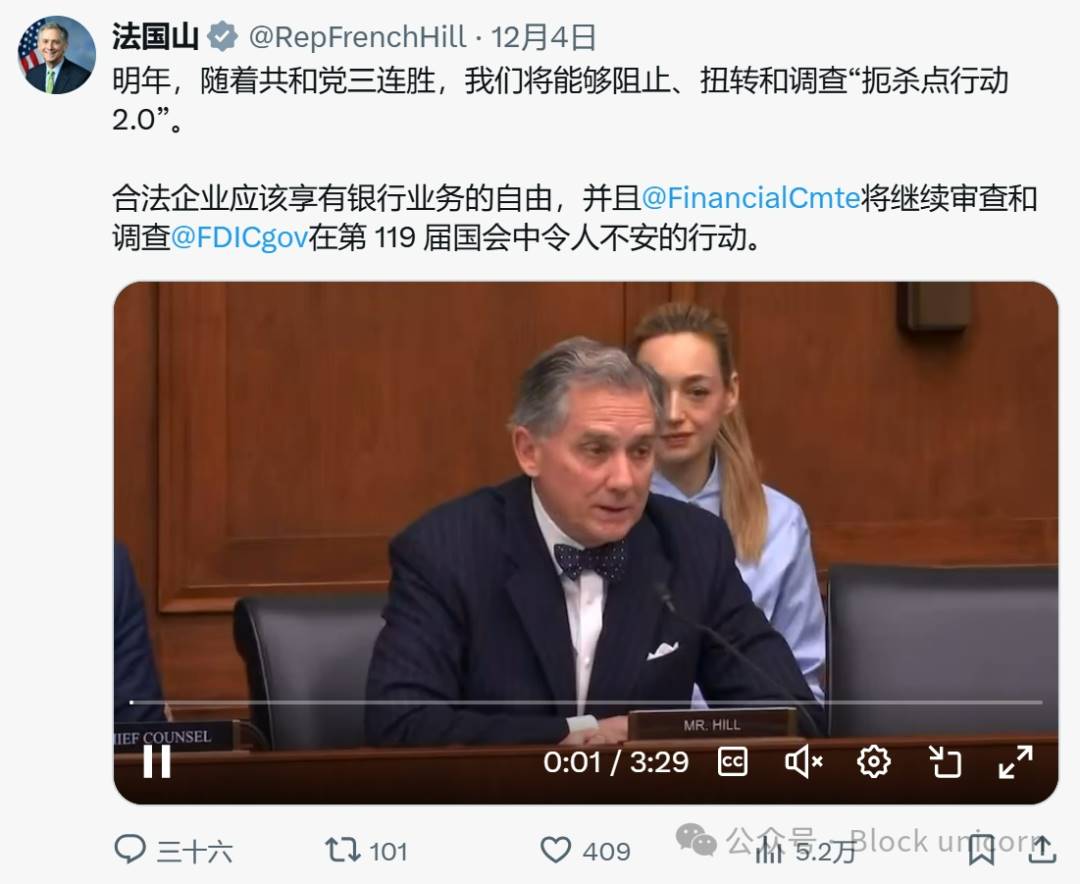
December 6 — Former Silvergate CTO Chris Lane (@D_CentralBanker) shared his experiences regarding regulatory pressure on crypto banking, drawing attention from David Sacks (@DavidSacks), who shared Lane's post and commented, "There are too many stories of people being harmed by Operation Choke Point 2.0. This needs to be investigated."
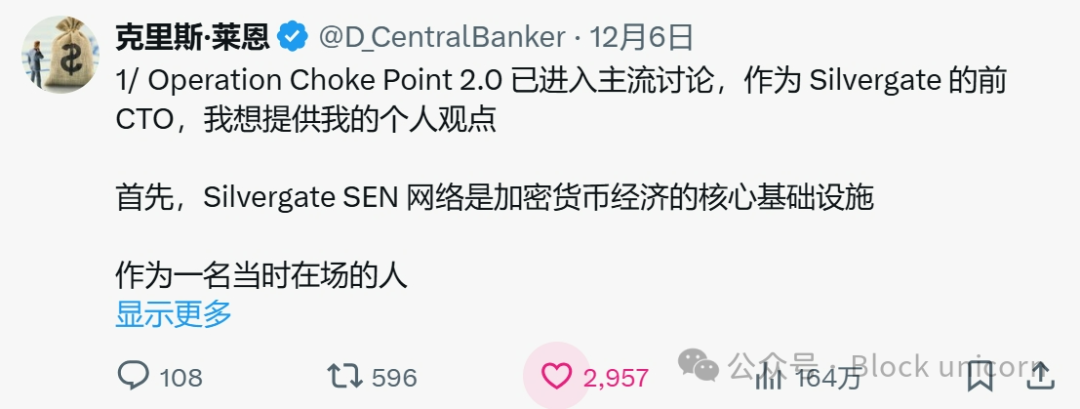
December 6 — Court documents submitted in a lawsuit against the FDIC revealed letters from the agency requesting banks to suspend crypto-related activities. "These letters indicate that Operation Choke Point 2.0 is not just some crypto conspiracy theory," said Coinbase Chief Legal Officer Paul Grewal (@iampaulgrewal).

December 10 — The New York Times published an article by Erin Griffith (@eringriffith) and David Yaffe-Bellany (@yaffebellany) analyzing how debanking has quickly become a "political weapon."
December 19 — SEC Commissioner Hester Peirce (@HesterPeirce) voted against approving the $400 million budget for the Public Company Accounting Oversight Board (PCAOB), expressing concerns that the board "is trying to use regulatory measures to prevent regulated entities from providing services to the cryptocurrency industry and its participants or otherwise engaging with cryptocurrency." Despite Peirce's opposition, the budget was approved by three other commissioners, including SEC Chair Gary Gensler.
2. Is Banking a Right?
Banking is a service provided by private enterprises. However, in an economy where nearly all transactions rely on financial infrastructure, the operation of this service is very similar to that of a utility. Without it, participating in modern life — whether paying bills, receiving wages, or obtaining credit — is nearly impossible.
In his conversation with Rogan, Andreessen argued that debanking could infringe upon constitutional rights. If banking services are essential to economic participation, then arbitrary refusals — or refusals under opaque political pressure — could constitute a deprivation of fundamental rights. While the Constitution does not explicitly guarantee the right to banking services, legal precedents have established that financial activities are closely related to fundamental rights such as freedom of speech and due process.
The foundation of these debates lies in cases like Buckley v. Valeo (1976) and Citizens United v. Federal Election Commission (2010). Both rulings emphasized that money, as a medium of expression, is protected by the First Amendment. Although these cases centered on campaign finance, they established a principle: the ability to use financial resources is crucial for participating in public discourse. If financial services can be arbitrarily denied, it effectively suppresses legitimate voices.
The Fifth and Fourteenth Amendments' guarantees of due process provide another perspective: in Goldberg v. Kelly (1970), the Supreme Court ruled that government benefits essential to an individual's livelihood cannot be terminated without due process. While banking is provided by private entities, its critical role in modern life aligns it with utilities, suggesting that arbitrary refusals to provide banking services may violate due process protections.
The issue of financial neutrality, particularly the problem of debanking, has already been put to the test this year. In the case of NRA v. Vullo (2024), the Supreme Court unanimously ruled that the New York State Department of Financial Services Superintendent could not use her power to force banks and insurance companies to sever ties with the NRA. Justice Sonia Sotomayor stated that while regulators can express opinions, they cannot compel financial institutions to discriminate against legitimate entities based on political positions.
These rulings confirm that financial exclusion—whether due to direct government coercion or indirect reputational pressure—raises significant constitutional issues. As Andreessen pointed out on "The Joe Rogan Experience," "Five years from now, the Supreme Court may have a case that retroactively rules all of this illegal."
3. Legitimate Businesses Are Legitimate
At its core, debanking poses a simple question: if an entity operates within the law, should it have the right to access banking services? The answer seems obvious—but the trend of debanking legitimate businesses suggests otherwise.
This should be a non-political statement. The OCC has issued guidance stating that it does not permit broad, targeted discrimination against businesses engaged in lawful commercial activities.
Excluding compliant businesses from basic financial services is a dangerous trend—it has the potential to embed subjective biases into the pillars of modern economic infrastructure. If the financial system chooses which legitimate entities to support, it ceases to be a neutral platform and instead becomes a tool for enforcing political or cultural agendas.
Fair access does not mean forcing banks to take on undue risks. Rather, it is about ensuring that the financial system remains inclusive and neutral, providing the capacity for all legitimate businesses to operate. Without this neutrality, we risk turning banking into a gatekeeping mechanism that stifles innovation and undermines social trust, thereby eroding confidence in one of society's most critical systems.
4. Zero Hash: A Case Study in Regulatory Overreach
At Zero Hash, we have experienced these challenges firsthand. Despite adhering to the highest standards of compliance—standards that have earned us the trust of over 75 institutions, including Interactive Brokers, Stripe, and Franklin Templeton—we still face significant barriers in securing and maintaining banking relationships.
Our extensive licensing underscores our commitment to transparency and compliance. We are authorized to operate in over 200 jurisdictions worldwide, including all U.S. states and territories. In the U.S., our licenses include:
New York Bitlicenses: One of the strictest regulatory frameworks for virtual currency businesses.
Money Transmitter Licenses (MTLs): Allowing us to operate in all 52 U.S. jurisdictions (50 states plus Washington D.C. and Puerto Rico) and ensuring compliance with state-level requirements for money service businesses.
FinCEN registration as a Money Services Business (MSB): Complying with federal anti-money laundering (AML) and counter-terrorism financing (CTF) obligations.
Even though our licenses are comparable to or exceed those of traditional financial institutions, they still hesitate to work with us. In the past 18 months, we proactively contacted over 120 banks, of which about 80% refused to engage in any substantive discussions purely based on the industry. Among the banks that participated in discussions, only half conducted due diligence.
This issue is less prevalent in Europe. International banks willing to work with us actively collaborate abroad but explicitly refuse to do so in the U.S. Ironically, it is the same bank dealing with the same company, facing the same risk profile—but regulatory and political factors in the U.S. create barriers that do not exist elsewhere. This disparity highlights the chilling effect of unclear regulatory frameworks and overregulation, which actively hinders innovation in the U.S. and forces companies to look elsewhere to build the future.
5. The Stakes of Financial Neutrality
Debanking is not just a logistical obstacle—it directly challenges the principles of fairness, freedom, and trust upon which our financial system relies. This issue is not limited to cryptocurrency; it concerns ensuring that everyone has access to modern financial infrastructure.
免责声明:本文章仅代表作者个人观点,不代表本平台的立场和观点。本文章仅供信息分享,不构成对任何人的任何投资建议。用户与作者之间的任何争议,与本平台无关。如网页中刊载的文章或图片涉及侵权,请提供相关的权利证明和身份证明发送邮件到support@aicoin.com,本平台相关工作人员将会进行核查。




